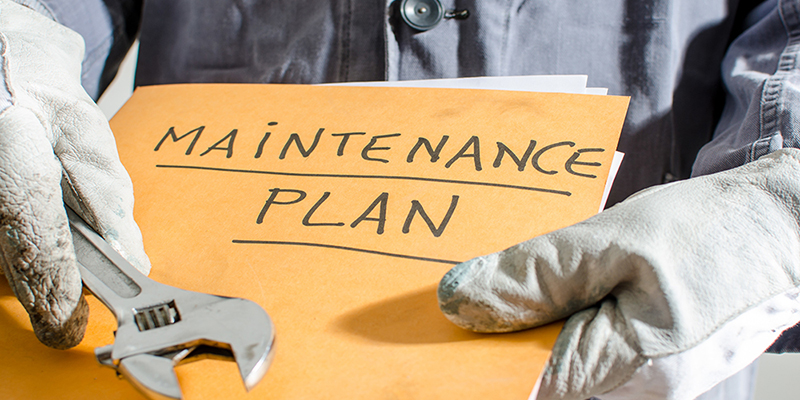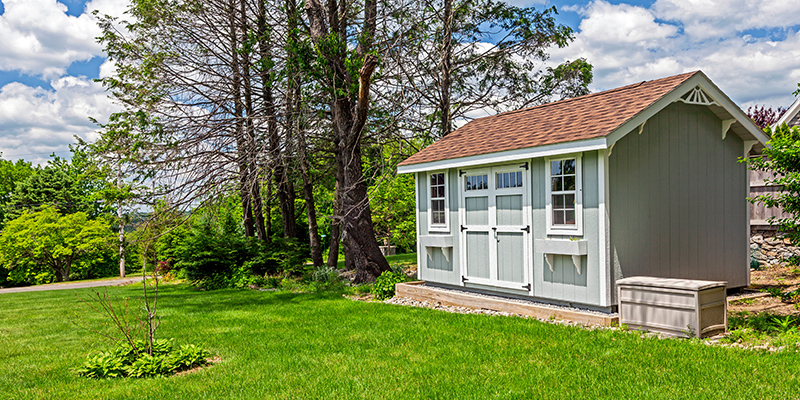5 HOA Maintenance Plans You Must Have

Contrary to the popular adage, “If it ain’t broke, don’t fix it,” homeowners associations must be proactive when it comes to maintaining common areas. It’s important to have maintenance plans so the community can run efficiently. By anticipating repairs and replacements, board members can also drastically reduce HOA expenses. For a smooth-running association, here are five HOA maintenance plans you must have.
Browse By Category
Sign up for Our Newsletter
Contrary to the popular adage, “If it ain’t broke, don’t fix it,” homeowners associations must be proactive when it comes to maintaining common areas. It’s important to have maintenance plans so the community can run efficiently. By anticipating repairs and replacements, board members can also drastically reduce HOA expenses. For a smooth-running association, here are five HOA maintenance plans you must have.
Why Do You Need HOA Maintenance Plans?
A lot of HOAs still do not have solid maintenance plans in place. Instead, these associations have a reactive approach to maintenance.
The board will wait for something to fail before repairing or replacing the component. This reactive approach is very common in financially-strapped associations. Since maintenance costs money, they will defer repairs or replacements until they are absolutely necessary.
However, a reactive approach to maintenance will only end up costing the association more. Reactive maintenance tends to cost 9 to 10 times more than preventive maintenance. While preventive maintenance requires an association to spend money at regular intervals, they will end up spending less in the long run. This is also because preventive maintenance deals with minor issues. On the other hand, reactive maintenance already deals with major damage to a component, which is more costly to repair or replace.
Apart from being cost-effective, here are the other benefits of having HOA maintenance plans:
Longer Lifespan
As part of a maintenance plan, the HOA will conduct regular repairs for common area components. By keeping everything in good working condition, HOA can extend the useful life of components. Thus, the association can get a better value for its money.
Promotes a Safe Environment
When common area elements are properly maintained, they are less likely to break down and cause safety hazards for your residents. With a maintenance plan in place, the HOA can also monitor the structural integrity of components. This helps prevent significant damage in case of catastrophic weather conditions such as hurricanes, storms, and floods.
Keeps Residents Happy
HOA maintenance plans ensure that common areas are always running as they should. There are no unexpected closures due to equipment failure. When everything is functioning as designed, residents are able to use the association’s amenities or services freely. Thus, homeowners are happier and have a better quality of life.
Increases Property Values
HOA maintenance plans help preserve property values. A community that is beautiful and well-maintained is more likely to attract new homebuyers. Welcoming new homeowners to the community is not only good for morale, but it also keeps the association financially stable.
5 HOA Maintenance Plans You Must Have
With a better understanding of the benefits of HOA maintenance plans, here are five that you must have for your association.
1. Preventive HOA Maintenance Plan
 Preventive maintenance is the most popular type of HOA maintenance plan. It requires associations to be more proactive about repairs and replacements.
Preventive maintenance is the most popular type of HOA maintenance plan. It requires associations to be more proactive about repairs and replacements.
Common area components are maintained on a regular — regardless of their condition. The purpose of this maintenance plan is to prevent the likelihood of a component from breaking down or to at least minimize the consequences in case the component fails.
Preventive maintenance is typically time-based. Components are maintained weekly, monthly, or annually. However, preventive maintenance can also be based on usage cycles. Examples of scheduled maintenance include pool maintenance every month, gutter cleaning every six months, parking lot restriping every 12 months, and lightbulb replacement every 25,000 hours.
Scheduled maintenance also makes HOA budget planning easier. The board can anticipate the maintenance needs of the association and will budget accordingly. Thus, there are no surprise expenses.
2. Predictive HOA Maintenance Plan
Predictive maintenance is similar to preventive maintenance since it is a proactive type of maintenance plan. It is also a condition-based maintenance plan.
Here, you are operating on the assumption that common area components will give warning signs when failure is about to occur. As such, a predictive maintenance plan requires constant monitoring of common area components. The goal is to detect minor problems and address them as soon as possible.
Predictive maintenance can help save associations money. Since you’re able to address minor issues before they develop into large-scale damage, you can also avoid costly repairs and replacements.
A prime candidate for predictive or condition-based maintenance would be the HVAC system. While preventive maintenance for HVAC is also important, it cannot completely detect problems that may lead to failure.
Predictive maintenance for HVAC may include a machine teardown every 5,000 hours to collect important data and measure its condition. For systems like the HVAC, predictive maintenance is more cost-effective.
3. Seasonal HOA Maintenance Plans
Seasonal maintenance plans are essentially preventive maintenance. However, if you want a comprehensive maintenance plan for your community, it can be beneficial to have a specific maintenance plan for every season. This would include maintenance tasks that are applicable during a certain season. For instance, snow removal services are only needed during the wintertime.
Seasonal maintenance plans can also help determine the ideal timing for certain maintenance tasks. A spring maintenance plan can include repainting the common areas, resurfacing asphalt surfaces, landscaping, and other tasks that are more suited for drier weather conditions.
4. Deferred Maintenance Plan
HOAs should not aspire to have a deferred maintenance plan, which is when maintenance tasks are put into a backlog due to financial restraints. However, finances are a major concern for many associations. Some HOAs may have no other option but to defer maintenance plans.
If you are considering this type of maintenance plan, only do so for non-essential maintenance tasks. Do not defer maintenance for components and equipment that your homeowners need or rely on. Your deferred maintenance plan should not lead to safety and health hazards for the entire community, a decline in property values, and an increase in insurance costs.
5. Emergency Maintenance Plan
While not literally a maintenance plan, the HOA board has the obligation to prepare for any type of emergency. It is a type of corrective maintenance that requires immediate action. It will take precedence over other maintenance tasks. As a result, your normal maintenance schedule becomes disrupted. Consequently, it could also disrupt the community’s overall operations.
An example of emergency maintenance would be a roof collapse. Since having a roof is essential, the HOA will have to focus on repairing it. Roof replacement is very expensive, so it may deplete resources intended for other maintenance tasks. This is not ideal because these other components also need regular maintenance to function properly.
However, an emergency maintenance plan can be useful when incorporated into the HOA’s disaster management plan. If the association can anticipate the emergency failure of components or equipment, it can also create action plans for how to deal with these extreme situations.
If the HOA board makes plans for the possibility of roof collapse due to a natural calamity — such as saving money specifically for roof expenses — the association won’t be left in disarray in case it really happens.
How to Create Successful HOA Maintenance Plans
 Having several HOA maintenance plans makes your community better prepared for whatever may happen in the future — whether it is expected or unexpected. Regardless of what HOA maintenance plan you might have for your community, here are some tips to make it as successful as possible.
Having several HOA maintenance plans makes your community better prepared for whatever may happen in the future — whether it is expected or unexpected. Regardless of what HOA maintenance plan you might have for your community, here are some tips to make it as successful as possible.
- Board members should continue to have an active role in HOA maintenance plans. Do not entrust everything to your HOA management company. In case there is a management change, you won’t be left scrambling on what needs to be done.
- Regular inspections are essential, especially if you have preventive and predictive HOA maintenance plans in place. Do not hesitate to enlist the services of an engineer or property manager. They will know what to look out for and will be more likely to notice subtle changes in your components’ condition.
- An HOA reserve study is critical when developing your maintenance plans. You need an up-to-date reserve study to determine the remaining useful life of components. This will be very useful when coming up with your maintenance schedule.
- Have a log of all common area components. You should also have all relevant documentation for each component, such as warranties, manuals, repair history, maintenance requirements, expected costs, and timeframes.
Create HOA Maintenance Plans for Better Community Operations
If you want your community to run like a well-oiled machine, it’s important to have HOA maintenance plans in place. With an HOA maintenance plan, the board has a complete log of common area components as well as maintenance schedules and timeframes.
Since there are many common area components in an association, being as organized as possible will help you save time and money. HOA maintenance plans have other attractive benefits as well, including high property values, increased quality of life for homeowners, and financial stability.
RELATED ARTICLES:
- Investing HOA Reserve Funds The Right Way
- 5 Valuable Tips When Hiring HOA Maintenance Company
- Everything You Should Know About Condo Maintenance
Trending Now
Related Article
Sign up for Our Monthly Newsletter
Sign up below for monthly updates on all HOA Resource
















